
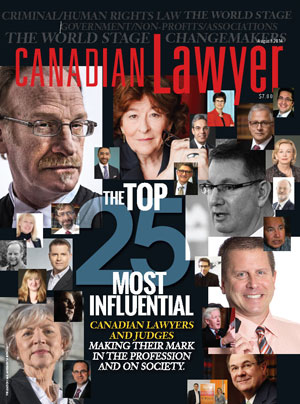
Canadian Lawyer’s Top 25 Most Influential in the justice system and legal profession is now in its fifth year. The Top 25 is always one of the magazine’s most-read, and most commented-on features. Of course our choices likely won’t meet with universal approval but a little healthy debate among readers is always welcome. Again this year, we used the tried-and-true formula of asking for nominations from legal groups and associations representing a variety of memberships and locations; last year’s Top 25 honourees; our readership; and an internal panel of writers and editors.
We received almost 120 nominations, which the internal panel whittled down to the 100 candidates who met our criteria. We then posted the list of 100 online and asked our readers to give us their opinions, which they did in spades. An astounding 6,112 people voted and commented on those who they thought were the most influential in the profession over the past 18 months.
Nominations and votes were up almost 25 per cent over last year, which is a testament to the great work lawyers are doing in society at home and abroad. The final list of 25 presented here is based on that poll with input and the last word from the internal editorial panel.
The Top 25 Most Influential is not just about bright stars, big deals, or number of media mentions — although those may play a part. We have endeavoured to select lawyers who have been influential within the profession as well as society in the last year and a half. This year, we also looked at the role of Canadian lawyers in the international community. Closing a big deal, for instance, may not have a substantial impact beyond that particular business or industry. Inclusion in the Top 25 talks to a level of respect, the ability to influence public opinion, and to help shape the laws of this country and others; contribution to the strength and quality of legal services as well as access to justice; and social and political influence and involvement.
The Top 25 is split into five areas of influence, with one change from last year. The top five in each of the following categories have made the final list: corporate-commercial law; changemakers; criminal and human rights law; government, associations, and non-profits including public inquiries and officers of Parliament; and the all-new world stage. Nominees were put in the category in which the individual exercised their influence during the time period.
A number of previous winners are back this year: Supreme Court of Canada Chief Justice Beverley McLachlin; Vancouver criminal and human rights lawyer Joseph Arvay; Osgoode Hall law professor Alan Young; and Ontario Ombudsman André Marin. This year’s list also sees a strong cohort of new movers and shakers including Toronto lawyer Rocco Galati, who challenged the federal government’s appointment of Justice Marc Nadon to the Supreme Court of Canada; Mark Morris and Lena Koke, who shook up the profession with the launch of their Wal-Mart store-based law firm; and federal government whistleblower Edgar Schmidt. There are also Canadians who’ve made their mark internationally in quite different ways such as Murray Klippenstein, who is representing Guatemalean villagers in a suit against HudBay Minerals Inc., and Moya Greene, the first non-Briton to head the Royal Mail.
Worth remarking on is the huge number of votes that came in for McLachlin — at least triple the number of the person with the second-highest number of votes. The chief justice was lauded over and over again for her integrity, grace, and professionalism in responding to veiled accusations from Prime Minister Stephen Harper that she behaved inappropriately by pointing out to the PMO an issue may arise with the appointment of a federal court judge to fill a spot on the SCC bench (which it did!). “Truly admirable!” one voter said about McLachlin’s measured response. While the situation was not the major spat between the chief and the PM that some media made it out to be, the legal profession’s response was indicative of the respect in which McLachlin is held.
Also worth a mention is Bob Kuhn, the president of Trinity Western University in Langley, B.C, and one of the most controversial nominees. He had led the university’s initiative to open a law school, which has been given the green light but still faces strong opposition from the profession and certain law societies due to its controversial student covenant. Led by Kuhn, TWU is fighting back, launching lawsuits in Ontario and N.S. that will likely end up in the Supreme Court of Canada pitting the Charter right of freedom of religion against others. While he didn’t make the final 25, Kuhn had strong voter support, particularly from the TWU community. One voter noted: “Bob Kuhn is the definition of a distinguished and honourable lawyer; his convictions are not swayed by what passes in a moment, but are guided by ethical judgment and deeply held beliefs.”
So without further ado, here are the 2014 Top 25 Most Influential. They are listed with the top vote getter in each category first, followed by the others in alphabetical order.
Disagree with the choices? Did we miss someone obvious? Post your feedback in the comments section below or e-mail it to[email protected].We’ll be doing it all again next year.
CHANGEMAKERS
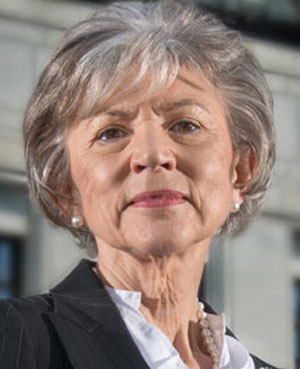 Chief Justice Beverley McLachlin
Chief Justice Beverley McLachlin
Chief Justice, Supreme Court of Canada, Ottawa
McLachlin made headlines across the country this year when she came under fire from Prime Minister Stephen Harper for a standard phone call she made to his government regarding appointments to the top court. As one nominee noted, “her principled stand against the attacks of Harper and his government definitely represent the leadership story of 2014.” The extreme high regard McLachlin commands in Canadian society is evident through the strong support she received and her massive vote count in this year’s Top 25. McLachlin is very vocal and active in working for better access to justice and speaks widely in the legal sphere and beyond on the issue and the role of the courts. Earlier this year at the Canadian Corporate Counsel Association meeting, she once again challenged the profession to engage in a “richer debate” on the question of why there aren’t more women in the profession and on the bench. McLachlin has gone a long way to make the top court more accessible and transparent to Canadians by being an approachable face of the judiciary.
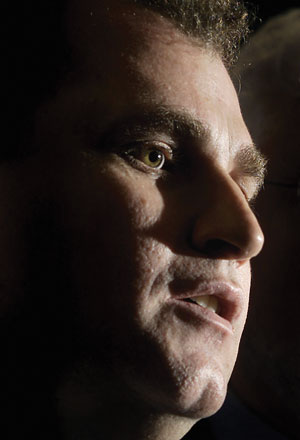 Rocco Galati
Rocco Galati
Rocco Galati Law Firm, Toronto
Galati’s mistrust of authority has often made him a focal point in the national media. This past year, Galati made huge waves by challenging the government on its appointment of Justice Marc Nadon to the Supreme Court of Canada. Galati’s challenge led to widespread public debate on both the judicial appointment process and areas of the constitution and division of powers. In large part due to Galati’s challenges, Nadon’s appointment was unsuccessful, but he didn’t stop there. Galati has also challenged the appointment of Justice Robert Mainville of the Federal Court to the Quebec Court of Appeal as well as suing the government over changes to the Citizenship Act.
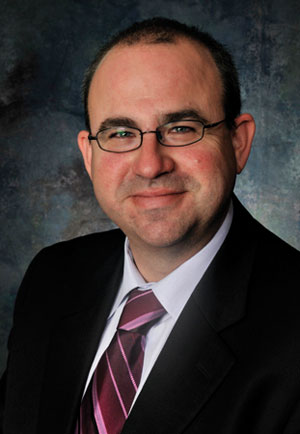 Adam Dodek
Adam Dodek
Vice dean, University of Ottawa
Faculty of Law, Ottawa
Dodek is emerging as a Canadian champion for legal professionalism and legal ethics. He writes and speaks widely on the subject and has been very involved in issues surrounding professional regulation and legal education. Dodek has published several legal books, with his most recent in 2013 explaining the Canadian Constitution in ways accessible to the average Canadian. At the University of Ottawa, Dodek teaches public law and legislation, legal ethics and professional responsibility, and a seminar on the Supreme Court of Canada. He currently serves as a board member on the Law Commission of Ontario, and is a founding member of the Canadian Association for Legal Ethics.
 Mark Morris/Lena Koke
Mark Morris/Lena Koke
Co-founders, Axess Law PC, Toronto
Morris and Koke are the Top 25’s first ever co-recipients for a reason. Koke and Morris co-founded Axess Law, the first practice in North America to open an office in a big box store. Their offices, which are available in several Wal-Mart locations in the Toronto area, focus on providing convenient law services to the average person. With longer daytime hours, no appointments, lower prices, and convenient locations, the duo has created an appealing alternative to the traditional law office. If the two entrepreneurs have their way, Axess Law offices will be across Ontario within the next two years and nationwide within the next four. Their bold move has received both kudos and slings and arrows from members of the legal profession, but they are putting their money where their mouths are in terms of innovation of legal service delivery and access to justice.
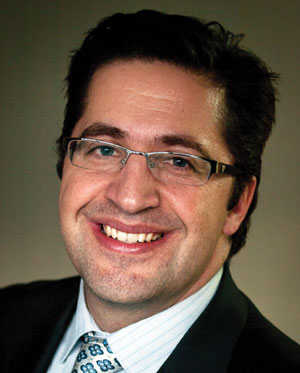 Colin Lachance
Colin Lachance
CEO, CanLII, Ottawa
CanLII, Canada’s largest open law web site, is a non-profit organization that has changed the way the legal community and the broader public access law as well as disrupting the traditional legal information world. In the last year, Lachance has been integral in a number of activities to improve access to justice and legal information for both lawyers and the general public. CanLII’s first Hackathon, for example, aimed to foster innovation in improving access to legal and public information. Lachance also launched CanLII Connects in April this year, which provides thousands of free, plain English legal commentaries on Canadian court decisions.
GOVERNMENT/NON-PROFIT/ASSOCIATIONS
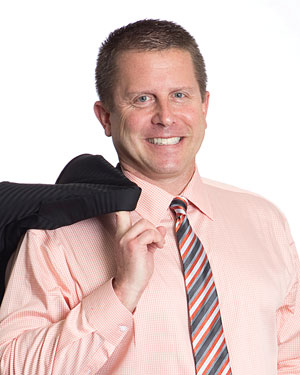 André Marin
André Marin
Ombudsman, Province of Ontario, Toronto
A Top 25 winner last year, Marin continues to be a tenacious and controversial advocate ensuring Ontarians are treated fairly and their tax dollars are not wasted. One of the biggest issues Marin will be taking on will be a review of Ontario Hydro’s billing practices. He has also released reports on jailhouse brutality and the Transportation ministry’s tracking of drivers with uncontrolled hypoglycemia. His determination to make sure taxpayers aren’t kept in the dark over what their money is used for has led Ontario to table legislation expanding the ombudsman’s powers of oversight to municipalities, universities, and school boards. Not everyone is onside with the outspoken Marin and sometimes his doggedness gets mixed results. Notably in the last 18 months, he tangled online with the Durham police after getting anonymous Twitter threats. He identified a Durham police officer as the source of the tweets but an investigation showed the ombudsman had named the wrong man — it was another officer who had been sending the unwanted tweets. Marin became Ombudsman in 2005, and was appointed to a second five-year term in 2010.
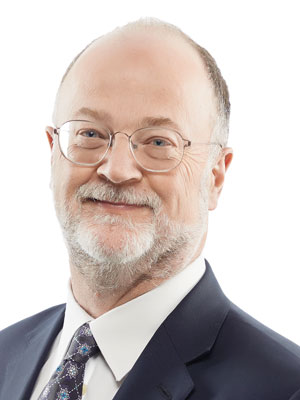 Malcolm Mercer
Malcolm Mercer
Partner and general counsel, McCarthy Tétrault LLP, Toronto
Mercer is leading the charge for alternative business structures in the legal profession. With 30 years of litigation practice under his belt, Mercer is well placed to have pushed the debate for change further this year as the working group he leads proposed amendments at the Law Society of Upper Canada that would allow non-lawyers to own up to 49 per cent of a law firm. A leader in professional ethics, Mercer is also an LSUC bencher, chairman of the Canadian Bar Association’s ethics and professional responsibility committee, and a member of the CBA task force on conflicts of interest.
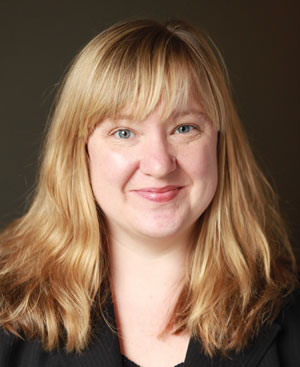 Amy Sakalauskas
Amy Sakalauskas
Child protection lawyer, Nova Scotia
Department of Justice, Halifax
Sakalauskas is all about equality. She played an instrumental role in Nova Scotia (and across Canada) in the last few years advocating against the accreditation of the law school at Trinity Western University, where students will be required to sign a document promising not to engage in sexual relations outside of a heterosexual marriage. Nationally, she championed a resolution for non-discrimination in legal education at the Canadian Bar Association’s mid-winter meeting in February that was passed. She has also urged law societies and The Federation of Law Societies to require all legal education programs to offer equal opportunity to everyone without discrimination. She is currently an executive member of the CBA, Nova Scotia Branch, and active in many areas.
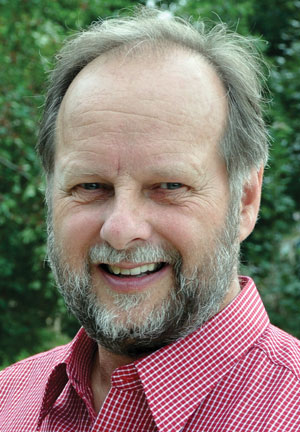 Edgar Schmidt
Edgar Schmidt
Former general counsel, Department of Justice Canada, Ottawa
Schmidt shocked the legal community when he sued his own ministry and exposed many ethical issues government lawyers face. After years of trying to get his bosses to listen, Schmidt was ready to lose his job to make public his complaint that the federal government doesn’t take adequate steps to vet whether proposed bills violate the Bill of Rights and the Charter of Rights and Freedoms. His whistleblower lawsuit, which is expected to begin later this year, could have dramatic ramifications for government lawyers in Canada by forcing changes to policy. After instigating legal action against the government, Schmidt was suspended without pay and barred from his office. He disputed any wrongdoing and it was agreed the DoJ would not take disciplinary action and he retired May 16, 2013.
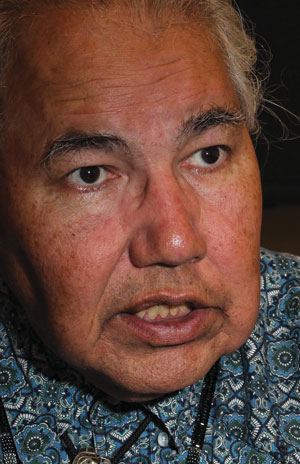 Justice Murray Sinclair
Justice Murray Sinclair
Judge, Provincial Court of Manitoba, Winnipeg
Manitoba’s first aboriginal judge, Sinclair is one of the most important faces of aboriginal issues in Canada, and his work with the Truth and Reconciliation Commission of Canada in the past year has been extremely progressive. He is the chairman of the commission, which has visited more than 300 aboriginal communities to help them come to terms with the history associated with residential schools. Under his guidance, the TRC held its first national awareness event earlier this year, where thousands were invited to share their stories of abuse. He is also outspoken in the media on the subject, through both writing articles and being featured in them.
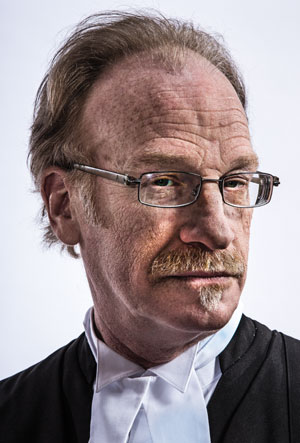 Alan Young
Alan Young
Professor, Osgoode Hall Law School, Toronto
One of Canadian Lawyer’s Top 25 Most Influential for many years, in 2013 Young was finally victorious at the Supreme Court of Canada in a case taking on the legality of the country’s prostitution laws. While the government has proposed a new bill to reflect the SCC’s decision in Bedford v. Canada, Young and many others are extremely critical of it. He has urged the feds to send the new bill directly to the SCC for a constitutional opinion, thereby sparing sex workers the cost, risk, and uncertainty of having to litigate protections for their health and safety all over again. In the past, Young has brought constitutional challenges to Canada’s gambling, obscenity, and drug laws, and is known for providing free legal services for people whose alternative lifestyles bring them into conflict with the law. His legal challenges led the federal government to create a regulatory program for the use of medical marijuana. Young is also the director of the Innocence Project at Osgoode Hall, which teaches students how to investigate cases of wrongful conviction.
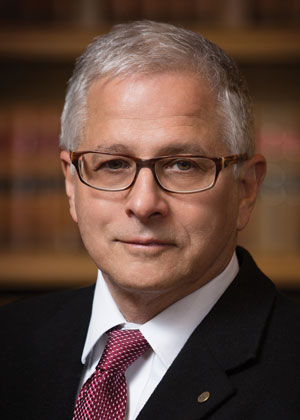 Joseph Arvay
Joseph Arvay
Partner, Farris Vaughan Wills & Murphy LLP, Vancouver
Arvay has appeared many times in the Top 25 Most Influential because he continues to push the country’s moral and ethical boundaries. He’s not afraid to take on some of the most socially complex cases in Canada, making way for change and improving the lives of Canadians, especially those on the edges of society. He is the lawyer who fought the federal government and won in the Insight injection case at the Supreme Court of Canada last fall. As a result of his work, the only legal, supervised drug injection site in North America will stay open to provide a safe place for use of drugs such as heroin, cocaine, and morphine. He also continues to work with the British Columbia Civil Liberties Association in the fight to decriminalize assisted suicide.
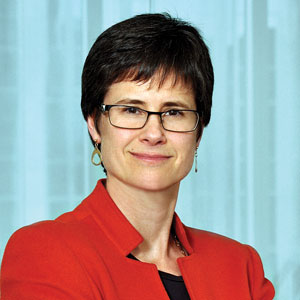 Elizabeth Grace
Elizabeth Grace
Partner, Lerners LLP, Toronto
Grace’s work in personal injury law focuses on claims arising out of sexual and physical abuse and the transmission of sexual diseases. In 2013, Grace was the first counsel ever to be asked to act as amicus curiae at the Ontario Superior Court trial of the historical sexual assault case Rosenthal v. Rosenthal, where the perpetrator was a parent of the victim and had no counsel. In this case, there were difficult legal issues to unwind around what constitutes a sexual assault versus a breach of a parent’s fiduciary duty. Grace is a frequent speaker and writer on sexual assault, and was a recipient of the Women’s Law Association of Ontario President’s Award in June 2014.
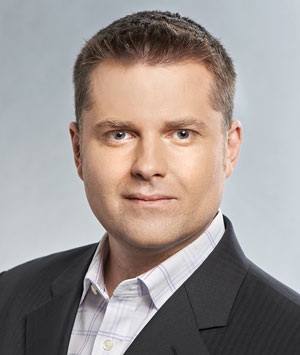 Jason Madden
Jason Madden
Partner, Pape Salter Teillet LLP, Toronto
Madden’s work on behalf of the Métis of Canada has contributed to a whole new area of law being developed. In 2013, he represented the Métis in Daniels v. Canada. As a result of Madden’s work, the Federal Court of Canada ruled that 200,000 Métis and 400,000 non-status Indians in Canada are indeed “Indians” under the Constitution Act, a win that clarifies the federal government has jurisdictional responsibilities to provide services to the Métis. Madden also represented the Manitoba Métis Federation in land compensation negotiations regarding Manitoba Hydro’s proposed pipeline. He is also a regular speaker at conferences and law schools on aboriginal legal issues.
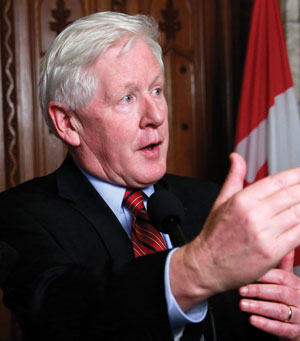 Bob Rae
Bob Rae
Senior partner, Olthuis Kleer Townshend LLP, Toronto
The former premier of Ontario and MP for Toronto Centre is an aboriginal rights activist on a mission. Rae resigned from his role in Parliament in July 2013 so he could join Olthuis Kleer Townshend, a law firm that specializes in aboriginal law. The former interim head of the federal Liberal Party is now the chief negotiator for nine different First Nations groups in talks with the Ontario government on opening up their land for development of the Ring of Fire. He is also a senior adviser to the Mississaugas of the New Credit, and works with the First Nations Group Ltd. Partnership in British Columbia.
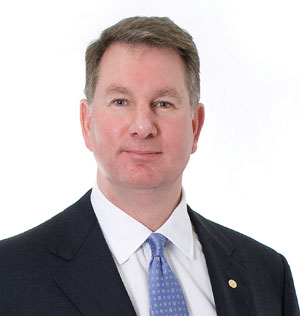 Simon Fish
Simon Fish
General counsel, BMO Financial Group, Toronto
Named Canada’s General Counsel of the Year in 2013, Fish “is reshaping the external counsel relationship model, encouraging greater diversity, and being a leader in sustainability.” At BMO, Fish is responsible for the overall legal affairs of the bank, including the compliance, corporate security, and corporate secretarial functions. In 2013, under Fish’s guidance, BMO became one of the first financial institutions in Canada to ask its external law firms to report on diversity metrics of their workforces. Last year, he advised the bank’s board on a new board diversity policy which it adopted: this policy commits BMO to board composition in which each gender comprises no less than one-third of the independent directors and the promise of public disclosure. BMO also now expects 40 per cent of its executives to be women by the end of 2016. Prior to working at BMO, Fish served as executive-vice president at Vale Inco, worked as vice president, general counsel and corporate secretary of Shell Canada, and practised corporate and securities law with international law firm Dechert LLP.
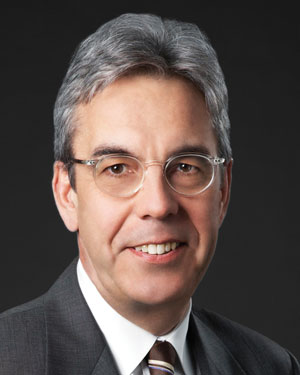 Peter Griffin
Peter Griffin
Managing partner, Lenczner Slaght Royce Smith Griffin LLP, Toronto
Griffin is a top litigator, with experience in corporate-commercial litigation, class actions, securities matters, insolvency, and professional and director/officer liability. He also has experience in complex cross-border litigation, where he has appeared before fellow Top 25 honouree Justice Geoffrey Morawetz. Griffin was lead counsel, with Peter Osborne and Shara Roy, for the defendant auditors of Sino-Forest Corp. in connection with a $9-billion shareholder class action. They negotiated the settlement and a CCAA settlement structure, which was resolved against EY at $117 million with no possibility that claims for contribution and indemnity by co-defendants or claims by opted-out class members could ever arise against EY after the settlement was completed.
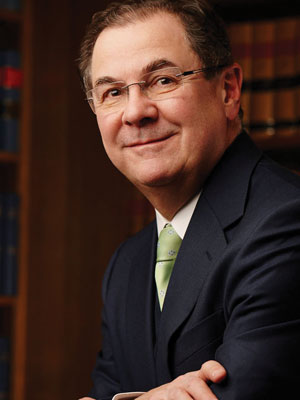 Justice Geoffrey Morawetz
Justice Geoffrey Morawetz
Judge, Ontario Superior Court of Justice, Toronto
Morawetz, who appeared in the Top 25 in 2011, is no stranger to mainstream media attention. He has recently been involved in several significant cases, such as the lengthy trial to determine the allocation of Nortel Inc.’s assets. The cross-border bankruptcy trial, which began in May, will determine how much money should go to the company’s Canadian parent and how much to its international subsidiaries. Morawetz also presided over the Sino-Forest Corp. class action settlement, a trial that reached a $117-million settlement this March. He is currently the team leader of Toronto’s busy and influential Commercial List, and is an editor of the Canadian Bankruptcy Report. In December 2013, Morawetz was appointed regional senior judge for the Toronto Region.
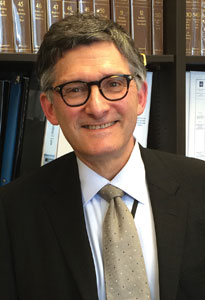 Justice Paul Perell
Justice Paul Perell
Judge, Ontario Superior Court of Justice, Toronto
A Top 25 winner in 2012, Perell continues to be a leader in class action cases and has made several significant rulings in class actions within the last year. In Bayens v. Kinross Gold Corp., Perell presided over a litigation funding decision that outlined principles to be considered where a proposed funding arrangement is before the court. In a 2014 decision, Perell ordered the government to hand over all Ontario Provincial Police documents in its possession related to the investigation at the St. Anne’s Indian Residential School in Fort Albany, Ont. Perell has brought his expertise to both Osgoode Hall Law School and the University of Toronto Faculty of Law as an adjunct professor.
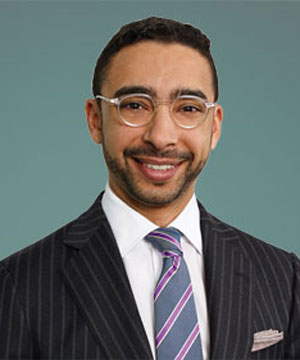 Walied Soliman
Walied Soliman
Partner, Norton Rose Fulbright Canada LLP, Toronto
Soliman is co-chairman of Norton Rose’s Canadian special situations team, which deals with proxy fights, hostile takeovers, and complex restructurings. Over the past several years, Soliman has been involved in almost every major proxy battle in Canada, acting for both issuers and activists. He was a member of the Agrium legal team in one of the most bitter, high-profile, and procedurally complex fights in corporate governance annals. He was also a member of the Telus team, which dealt with a variety of issues including empty voting. Soliman became a board member of the Toronto Sick Kids Hospital Foundation in 2012.
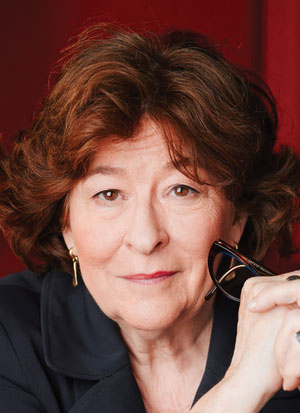 Louise Arbour
Louise Arbour
Former president and CEO, International Crisis Group, Belgium
Arbour is one of the best-known Canadians working internationally and has been on the global legal scene for many years. Although she stepped down from her position at the International Crisis Group on June 30, under Arbour, its efforts toward the prevention of deadly international conflicts, including publishing approximately 90 reports and briefings annually to help recommend policies that will create peace in targeted regions, has become much more well known. Arbour, a former Supreme Court of Canada justice, has played a key role in analysis and advocacy of many global conflicts, and in the past year and a half, has worked ith the ICG in the Central African Republic, Colombia, Niger, and Mexico. Arbour is involved with many other organizations including the Global Commission on Elections Democracy and Security, the Global Commission on Drug Policy, and the Global Commission against the Death Penalty. The Montreal native and Companion of the Order of Canada was previously the United Nations high commissioner for human rights as well as the chief prosecutor for the International Criminal Tribunals for the former Yugoslavia and Rwanda.
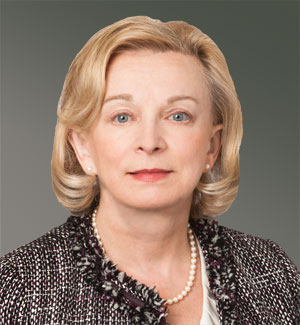 Moya Greene
Moya Greene
Chief executive, Royal Mail, London, U.K.
Born in Newfoundland and a graduate of Osgoode Hall Law School, Greene presided over the massive — and not without controversy — privatization of the U.K.’s Royal Mail last year. The Financial Times’ 2014 Person of the Year is the first non-Briton and woman to head Royal Mail, however, true to her Canadian heritage, she is also a board member of Tim Hortons Inc. Greene is a trailblazer and has received numerous awards including being named one of the U.K.’s most powerful women in 2013. Prior to working at Royal Mail, Greene was president, CEO, and a member of the board of Canada Post.
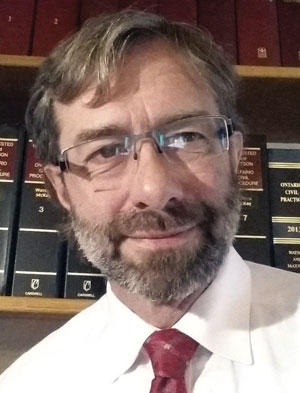 Murray Klippenstein
Murray Klippenstein
Founding partner, Klippensteins Barristers & Solicitors, Toronto
Klippenstein represents 13 members of the indigenous Mayan Q’eqchi population from El Estor, Guatemala, who have filed three related lawsuits in Ontario courts against Canadian mining company HudBay Minerals over the brutal killing of Adolfo Ich and the gang-rape of 11 women from Lote Ocho. In a precedent-setting ruling, an Ontario court ruled in July 2013 that the lawsuits can proceed to trial in Canada over the objections of HudBay Minerals. This was the first time a Canadian court ruled a claim could be made against a Canadian parent corporation for negligently failing to prevent human rights abuses at its foreign mining project. While this is an interim ruling, its impact is far-reaching, as it means allegations of human rights violations by Canadian corporations elsewhere can be heard in Canada.
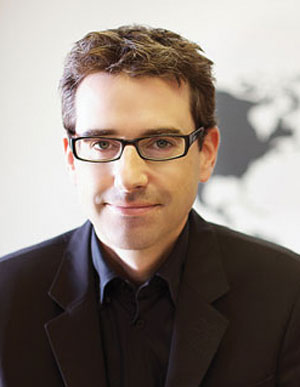 Pascal Paradis
Pascal Paradis
Executive director, Lawyers Without Borders Canada, Quebec City
Paradis is one of the founding members of Lawyers Without Borders Canada. Since 2002, LWBC has defended human rights, managed international co-operation programs, and embarked on dozens of annual missions focusing on justice and human rights. Based in Quebec City, LWBC has field offices in Colombia, Guatemala, and Haiti, where it has implemented its most comprehensive programs. Since becoming executive director in 2005, Paradis has completed projects within Afghanistan and Nigeria. LWBC also focuses its efforts on holding conferences and lectures to raise awareness of the issues they address, and Paradis is a frequent speaker at these events.
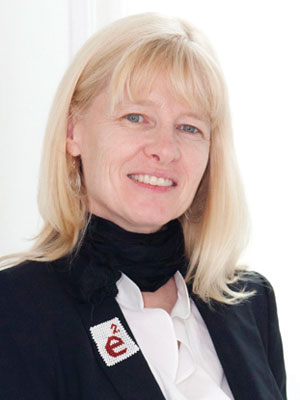 Fiona Sampson
Fiona Sampson
Executive director, The Equality Effect, Toronto
Sampson led an army of pro bono lawyers (and incredible fundraising efforts) in a successful lawsuit against the Kenyan police force in May 2013 for neglecting reports of rampant sexual abuse involving girls aged three to 17. The case, which received testimony from 160 Kenyan girls, eventually reached the High Court of Kenya, and concluded with a court order to ensure police carry out investigations in cases of rape against children. Any future failures will result in penalties and jail time for offending officers. Sampson’s organization, The Equality Effect, has other ongoing projects in Kenya, Malawi, and Ghana. Sampson has worked as counsel for the Ontario Human Rights Commission and as the Director of Litigation at the Women’s Legal Education and Action Fund.
This article was prepared with the assistance of Bruce Laregina.